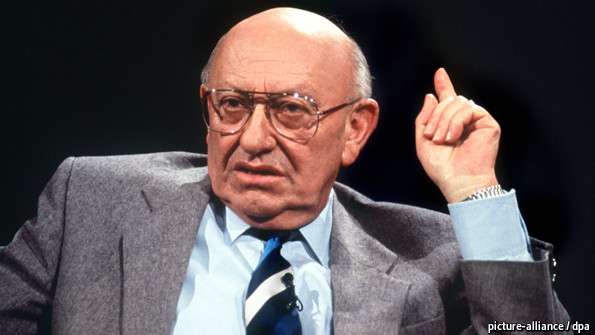THEY called him Literaturpapst, the “literature-pope”. For all his dislike of lazy metaphors, he did not contest that one. Marcel Reich-Ranicki revelled in fame—and in controversy. In the cautious, unctuous and back-scratching literary world of post-war West Germany, he liked to trade scratches face-to-face, with a snarling disdain which seemed only partly affected. He found literary theory and academic jargon as phoney as politeness. The right way to write was in crisp clear language, saying whether a book was good or bad, and why—and doing so with proper German words, not fancy foreign ones.
Even more distinctive than his epithets was his astonishing grasp of literature. Large parts of it he knew by heart. That was the right organ, for it was not only with his brain that he loved Schiller, Heine, Goethe and the others. They had kept him company in the darkest years of the Nazis. Though Hitler’s henchmen had killed his family, nobody, he said, could take away his Deutschtum (Germanness).
It had started in his childhood in a small Polish town, thanks to his mother, a book-loving rabbi’s daughter who spoke only German until the day she was gassed in Treblinka. It was stoked in Berlin (where the family moved after his Polish father’s business failed). His high-school teacher, Reinhold Knick, he wrote, was “the first person in my life who represented German idealism and personified that which, until then, I had only known from literature—the ideals of the German classics.”
Deported back to Poland by the Nazis in 1938, he survived the Holocaust by working as a translator for the Judenrat in the Warsaw ghetto, the body through which the Nazis made the Jews administer their own destruction. Thanks to his job, he spotted the deportation order that would have doomed his girlfriend. He wed her hurriedly; they escaped, and lived to celebrate 68 years of marriage.
In post-war Poland he scraped a living as a journalist and critic, escaping to West Germany in 1958 penniless and with scant formal education. But he had read everything—and seemed to know everybody, having befriended Germany’s leading authors on their trips to Poland. He was soon part of an influential liberal bookish clique, the Gruppe 47, and soared through journalism, editing a special literary supplement for the formidable Frankfurter Allgemeine Zeitung.
His next step took him from the cultural aristocracy to showbiz—another huge leap for an outsider. His talkshow, the “Literary Quartet”, was starkly produced and highbrow, but it could make or break a book, or a career. It was unmissable viewing for educated Germans, and those who wished they were. A highlight was a spectacular row (now a hit on YouTube) in which Mr Reich-Ranicki implicitly accused a fellow-panellist, the Austrian Sigrid Löffler, of frigidity after she mocked the clunky sex scenes in a novel by the Japanese author Haruki Murakami. After 77 editions, the show ended in 2001.
He simplified, exaggerated and polemicised without mercy, fear or favour, in a rasping, distinctive accent, hands waving, eyes glittering. “Too Far Afield”, a novel by Günter Grass, Germany’s best-known post-war writer, he dismissed simply as “worthless”. (Der Spiegel made that row into a cover story.) He could say the unsayable, too: Wagner was the biggest anti-Semite in German culture but Tristan and Isolde is the best opera in the world.
The love of bombast could be unbearable. Friends grew thick skins while some critics, consciously or not, echoed the Nazi taboo on “destructive” criticism. The author Martin Walser, the butt of many a savage slating, even wrote a novel, “Death of a Critic”, which lovingly recounted the murder of a lightly fictionalised Mr Reich-Ranicki. Ms Löffler said he was damaged by the “vanity machine” of television: it had made him more famous than the books and authors he was supposed to discuss.
Such criticism rarely bothered him, but he disliked it when his own past came under scrutiny in the 1990s. Having blasted East Germans for silence about their Stasi past, he turned out to have been not just a Polish communist, but a secret policeman, posted to London to spy on émigrés.
His response to that was blunt: it was not for modern Germany to hold him to account. And for what it was worth, the files turned out to contain nothing incriminating. He had quickly fallen out with the authorities, who recalled him to Warsaw, jailed him, and expelled him from the party. He bemoaned Germans’ lack of curiosity about his past, while at the same time remaining taciturn about it.
Your papers, please
He once claimed to be “half German, half Polish and wholly Jewish”, only to say later that none of that was true. He appreciated Jewish culture, especially its way with words, but found religion pointless and, after Warsaw, God inconceivable. “I believe in Mozart and Shakespeare,” he said.
Fame had its limits. He crossly turned down Germany’s leading television prize, in protest at the dross on the airwaves. A stunned audience of luvvies responded with another standing ovation. His own broadcasts were more elevated, always ending with a Brechtian phrase: “And so we, taken aback, see the curtain closed and all the questions open.”


Artículos Relacionados: